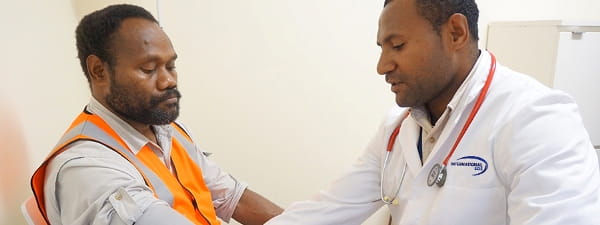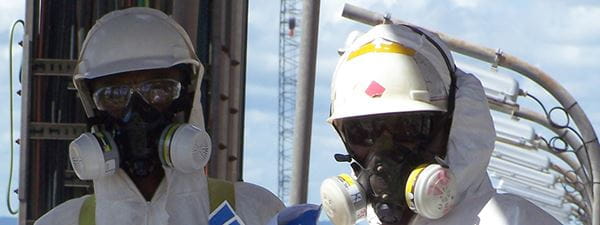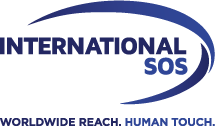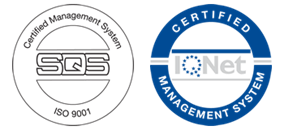Breaking New Ground in DRC
Published: September 2014
MANAGING THE RISK OF EMERGING INFECTIOUS DISEASES IN THE DEMOCRATIC REPUBLIC OF CONGO (DRC)
Outbreaks of emerging infectious diseases (EIDs) present a significant public health challenge. Causing widespread human suffering and community devastation, EIDs also pose major problems for individuals and organisations working in affected areas (typically resource-rich ‘tropical hotspots’ in the developing world), leading to disrupted operations and productivity losses.

To help manage the risk of EIDs in the Katanga Province of the Democratic Republic of Congo (DRC), International SOS is taking part in a multi-stakeholder initiative focusing on the extractive industry. Providing expert fieldwork coordination, project management and client liaison, International SOS is helping assess and prevent the impact of EIDs. This work enables the local mining companies to carry out their Duty of Care to employees and host communities.
The Infectious Disease Risk Assessment Management (IDRAM) initiative is an EID project led by the Centre for Global Health Security at Chatham House in London, with funding from USAID – the US Government agency that works to end extreme global poverty. The initiative is part of USAID’s Emerging Pandemic Threats program (EPT), which aims to pre-empt or combat at their source EIDs of animal origin that pose a threat to human health.
Approximately 75% of new human infectious diseases are thought to be linked to animal sources, and as mining companies push deeper into ‘animal habitats’ in the developing world they are increasingly coming into contact with EIDs such as rabies, cholera and haemorrhagic fevers. Indeed, certain research suggests that the socio-economic and environmental changes associated with extractive industry operations (e.g. land clearance, road development, labour camp construction and workforce immigration) alter the equilibrium between wildlife and human populations. This could facilitate the spread of disease, with 2% of all EID events since 1940 taking place specifically among mining companies or their host communities.
Over the years, many mining companies – and particularly those in Katanga Province – have demonstrated their commitment to strengthening local health system capacity and carried out impact health assessments (HIA) of their operations, as well as financed Corporate Social Responsibility (CSR) programmes to tackle infectious diseases. And in Katanga, the majority of resource companies adhere to the International Finance Corporation (IFC) Sustainability Framework and actively support the achievement of the Millennium Development Goals (MDGs). The 2014 Ebola crisis in West Africa (see pages 10-13 for more information) has demonstrated that despite such efforts EIDs can still have a devastating impact locally and pose major threats to extractive industry personnel and activities.
As Francesca Viliani, International SOS’ Head of Public Health Consulting Services and Community Health Programs, explains: “EID outbreaks and associated morbidity result in losses on all levels. Number one, there’s the potential tragic loss of human life. Then there are other associated impacts such as quarantines or isolation measures, plus extensive and costly decontamination procedures, all of which can contribute to operational disruptions and corporate reputational damage. So it’s crucial we understand how vulnerable people are to the threats, and whether there’s a risk of foreign workers transmitting these diseases back home. That’s why we’re involved in the IDRAM initiative, which aims to assess and reduce risk vulnerability and address business continuity issues. We saw what happened earlier this year as Ebola spread through Guinea, Liberia and Sierra Leone; neighbouring countries like Mali and Senegal closed their borders and mining ground to a halt. IDRAM is all about protecting local communities and looking after our clients’ people, operations and reputations.”
“We need to understand the potential for disease prevention and transmission reduction – which will help inform future responses to any large-scale outbreaks, should they occur.”
Francesca Viliani – Head of Public Health Consulting Services and Community Health, International SOS
FIELDWORK TESTING AND TOOLKITS
As a core member of the IDRAM initiative, International SOS has been enlisted to coordinate the pilot fieldwork project in Katanga and provide a vital interface between the mining companies, the provincial health and veterinary authorities, the University of Lubumbashi and various research teams. As medical services provider to many of the mining companies in Katanga, one of International SOS’ main tasks is to help test ‘vulnerability toolkits’ that were developed over the last three years to enable resource companies to examine their potential exposure to disease. In this way, International SOS will be assessing whether previous EID work carried out in the area is fit for purpose, and whether additional benefits can be extended to their clients in the field.
“The tools we’re looking at were developed by subject matter experts but never tested in a real life situation,” says Viliani. “Our task now is to bring all interests together and ensure that the recommendations are feasible and implementable and that everybody can be better protected and prepared to respond if needed. With our knowledge of the mining sites in Katanga and our good relationships with the multiple parties involved – NGOs, private companies, local leaders – we’re well placed to oversee this project and ensure it runs smoothly and scientifically.”
The testing will involve an in-depth qualitative study of EID risk perception in Katanga, including interviews with mining companies to understand how prepared they are for a potential outbreak.
“We need to understand the potential for disease prevention and transmission reduction,” says Viliani, “which will help inform future responses to any large-scale outbreaks, should they occur. Armed with this information, we can start to expand the current programmes beyond malaria control to address the full spectrum of EIDs for the benefit of our client organisations, local people and the extractive industry as a whole.”
The IDRAM initiative in the DRC got underway in April 2014, when Francesca Viliani (acting as Project Director), Dr Myles Neri (International SOS Medical Director and member of the Project Steering Group) and Dr Paul Mawaw (Senior Doctor at International SOS DRC and Project Field Manager) presented the project to the Governor of Katanga.
“The Governor was hugely supportive from the outset,” says Dr Myles Neri. “He’s behind us 100% and has committed to present the IDRAM project at the Africa Down Under Conference in Perth in September 2014.”
Additionally, interest from DRC’s Ministry of Health has provided a wider national dimension and increased project momentum, as Dr Neri explains: “There’s a real opportunity in Katanga to leverage the mining companies’ CSR efforts, their past collaborations with NGOs, as well as regional and national government support, and make IDRAM an exemplar project for the extractive industry. International SOS is privileged to manage a global health project of this importance on behalf of USAID and to support our mining company clients. Managing the risk of emerging infectious disease and outbreaks is a vital part of their commitment to assist the public health infrastructure of Katanga province and protect their host communities.”

Indeed, by developing collaborative dialogue and robust health and risk mitigation strategies, International SOS’ work in Katanga could pave the way for more EID-orientated projects in other global hotspots, as Francesca Viliani concludes: “We’re looking at what mining companies can do to monitor and prevent transmission and how they can enforce behaviour change among their workforce – for example, by avoiding bush meat, which is often a source of disease transmission - with a view to building EID awareness, prevention and best practice into extractive industry culture.”
The IDRAM initiative in the DRC got underway in April 2014, when Francesca Viliani (acting as Project Director), Dr Myles Neri (International SOS Medical Director and member of the Project Steering Group) and Dr Paul Mawaw (Senior Doctor at International SOS DRC and Project Field Manager) presented the project to the Governor of Katanga.
“The Governor was hugely supportive from the outset,” says Dr Myles Neri. “He’s behind us 100% and has committed to present the IDRAM project at the Africa Down Under Conference in Perth in September 2014.”
Additionally, interest from DRC’s Ministry of Health has provided a wider national dimension and increased project momentum, as Dr Neri explains: “There’s a real opportunity in Katanga to leverage the mining companies’ CSR efforts, their past collaborations with NGOs, as well as regional and national government support, and make IDRAM an exemplar project for the extractive industry. International SOS is privileged to manage a global health project of this importance on behalf of USAID and to support our mining company clients. Managing the risk of emerging infectious disease and outbreaks is a vital part of their commitment to assist the public health infrastructure of Katanga province and protect their host communities.”

Indeed, by developing collaborative dialogue and robust health and risk mitigation strategies, International SOS’ work in Katanga could pave the way for more EID-orientated projects in other global hotspots, as Francesca Viliani concludes: “We’re looking at what mining companies can do to monitor and prevent transmission and how they can enforce behaviour change among their workforce – for example, by avoiding bush meat, which is often a source of disease transmission - with a view to building EID awareness, prevention and best practice into extractive industry culture.”










